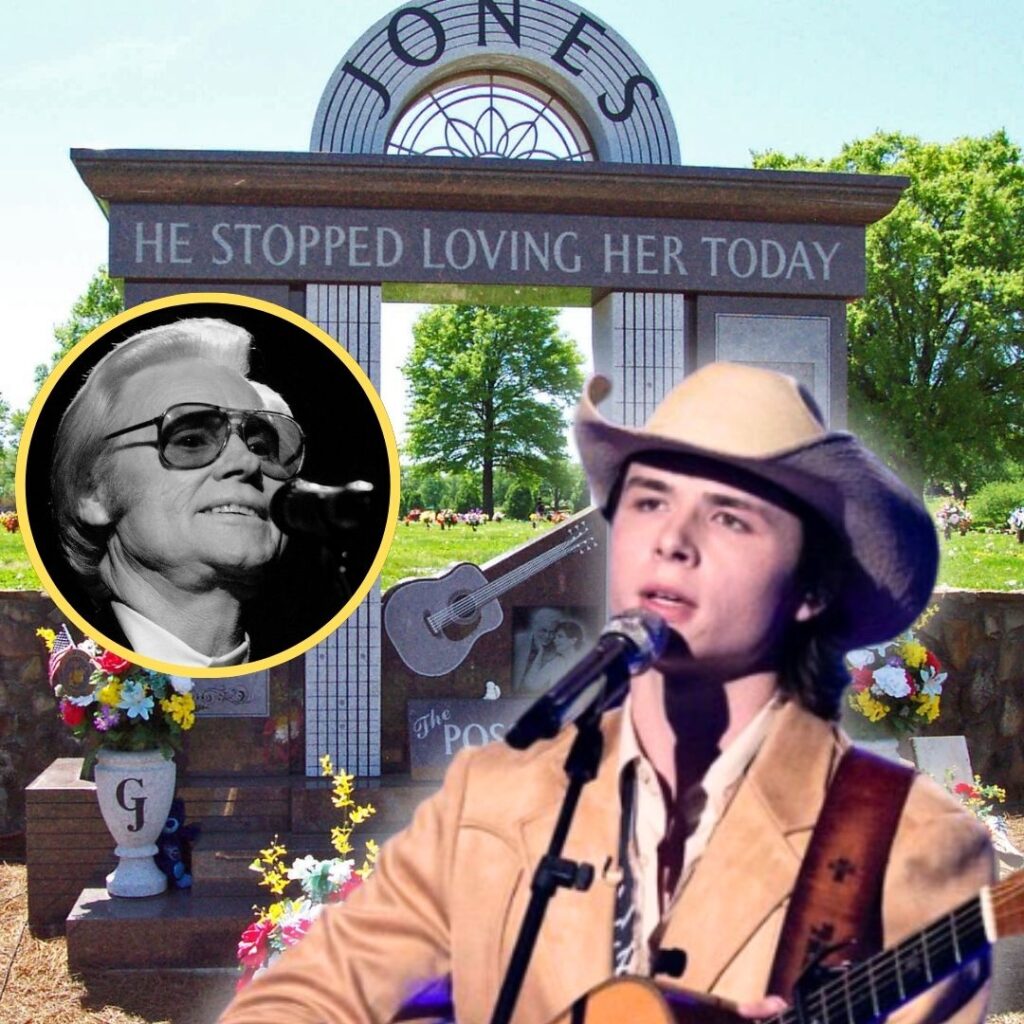
A Cold Morning in Nashville
It was a gray, silent morning in Nashville, the kind where even the wind seems hesitant to move. Frost clung to the grass of the Woodlawn Memorial Park Cemetery, and the only sound that broke the stillness was the crunch of gravel beneath John Foster’s boots. There were no cameras, no crowd, no stage lights—just a man, a guitar, and the final resting place of George Jones, the man whose voice once defined the soul of country music.
John Foster wasn’t there for attention. He came to pay tribute to the man who had taught him—like countless others—that music isn’t just heard; it’s felt. Standing before the gravestone etched with “He Stopped Loving Her Today”, he took a deep breath and began to play.
The Song That Defined a Legend
When Foster strummed the opening chords of “He Stopped Loving Her Today,” it felt as though time itself stood still. The song, forever linked with George Jones’ legacy, carries an almost spiritual weight in the history of country music. It’s a ballad about love, loss, and the kind of devotion that doesn’t end with death.
As Foster’s voice floated through the chilled morning air, each word carried raw emotion. His tone was soft, trembling—respectful. It wasn’t a performance; it was a conversation across time. The melody seemed to awaken something unseen. Birds stirred in the nearby oaks, and the breeze began to rise, swirling through the cemetery like a whisper.
And then… the whisper became something else.
A Voice on the Wind
Halfway through the second verse, as Foster sang “He said, I’ll love you till I die…”, another sound entered the air. It wasn’t an echo. It wasn’t feedback. It was a voice—low, gravelly, hauntingly familiar. Those present described it as if George Jones himself was singing along. The harmony came not from any speaker or second voice nearby, but from the wind itself, curling around the lyrics and blending perfectly with Foster’s melody.
Foster froze for a moment. His fingers trembled on the fretboard. The sound was unmistakable—rich, weathered, and heartbreakingly real. The few witnesses who stood nearby exchanged looks of disbelief. One woman, tears in her eyes, whispered, “It sounded like George.”
But Foster didn’t stop. He closed his eyes, steadied his breath, and kept playing. The harmony lingered—never overpowering, never clear enough to call proof—but strong enough to make everyone present believe that some voices never rest.
The Man Who Couldn’t Stop Loving Her
When the final note faded, the world went silent again. Foster lowered his guitar and looked toward the gravestone, his breath visible in the cold air. A faint smile crossed his face.
“Guess he still hasn’t stopped loving her,” he said quietly, referencing the song’s immortal line. It wasn’t a joke—it was a realization. For George Jones, love had always been more than a lyric. It was his life’s refrain.
As Foster turned to leave, a single gust of wind rushed through the cemetery, bending the trees and carrying the echo of that last note far beyond the gates. Some said it was coincidence. Others called it something more. But everyone who stood there that morning felt it deep within—the sense that George Jones was still there, still singing, still loving.
George Jones: The Voice That Never Faded
To understand why this moment carried such power, one must remember who George Jones truly was. Known affectionately as “The Possum,” Jones was more than a country star—he was a storyteller of pain, redemption, and love that refused to die. With hits like “The Grand Tour,” “She Thinks I Still Care,” and of course, “He Stopped Loving Her Today,” he carved a legacy that reshaped the landscape of country music forever.
His voice could make a room fall silent. It could turn heartbreak into poetry and tragedy into beauty. And though he passed in 2013, the music of George Jones refuses to stay buried. Every time his songs are played, his spirit seems to awaken—especially on that morning when the wind carried a harmony too perfect to be chance.
John Foster’s Tribute: A Moment Beyond Explanation
John Foster, a longtime admirer and fellow Nashville musician, never intended for the event to become a legend. He simply wanted to honor his hero. Yet that morning became something far larger than a tribute—it became a mystery that blurred the line between this world and the next.
Foster later described the experience as “the most humbling moment of my life.” He said that the sound didn’t frighten him—it comforted him. “I felt like George was telling me, keep singing, kid,” Foster explained. “Like he wasn’t gone at all.”
Stories spread quickly through Nashville’s music circles, and soon people began visiting Jones’ gravesite not just to mourn, but to feel that same connection. Some claim to hear faint melodies in the wind. Others say they feel an energy when they stand beside his resting place—a warmth that defies the cold Tennessee mornings.
A Legend That Lives On
Even years later, the story continues to inspire. Whether one believes in the supernatural or not, what happened that morning remains a symbol of the enduring power of music. George Jones didn’t just leave behind records and awards; he left behind emotion so strong that it refuses to fade.
Music has a way of bridging worlds—between past and present, between the living and the gone. And perhaps that morning, for a fleeting moment, the bridge held.
When John Foster sang at George Jones’ grave, something—or someone—sang back. Maybe it was the wind. Maybe it was the echoes of a song too powerful to die. Or maybe, just maybe, it was proof that love—and music—never truly stops.
George Jones’ voice may have gone silent in this world, but his spirit continues to sing. Every time the wind moves through Nashville, every time someone strums those familiar chords, his story lives on—a melody eternal, a legend reborn in every note that refuses to fade.